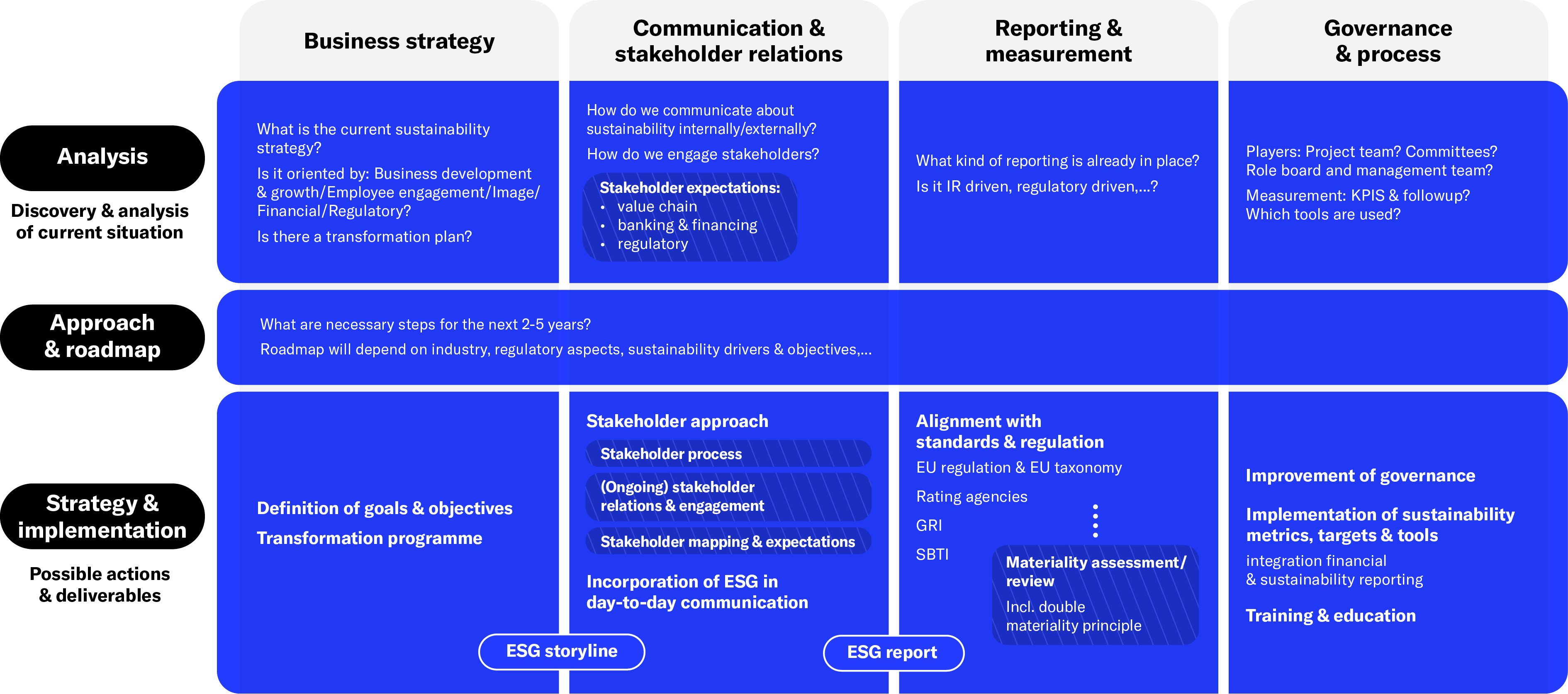This summer, the European Union adopted the European Sustainability Reporting Standards (ESRS). The standard covers a wide range of environmental, social, and governance issues (ESG). All companies covered by the Corporate Sustainability Reporting Directive (CSRD) will have to implement these.
We talked about these latest developments and what they mean for Belgian companies with Stefan Sallinger, our account director of sustainable business transformation and ESG reporting.

Let’s start from scratch: What does the CSRD directive entail, and why is it important for Belgian companies?
CSRD stipulates how companies must report on their sustainability and ESG from 2024 onwards. The impact varies by company. For listed companies, there already exists a directive called the NFRD, or Non-Financial Reporting Directive, which also requires non-financial reporting.
What is new is that ESG reporting will now also become mandatory for smaller companies and larger SMEs. In Belgium, 200 companies already reported compulsorily under the NFRD in 2022. From 2026 onwards, 2,800 companies will have to report. That’s 10 times more.
Many SMEs already have taken steps in their sustainability communication, partly because lenders have been asking for sustainability reporting for some time.
For Belgian companies, it means this:
- Companies are obliged to provide standardised information on their environmental, social, and governance (ESG) performance. Large companies have to be ready to measure by 2024 and report from 2025 onwards, SMEs only follow a year later. BUT: that does mean you have to start data collection in January 2024 for your 2025 ESG report.
- Companies should publish their ESG reports publicly so that customers, investors, and the general public can access information on sustainability.
- Companies need to adapt their operational processes. Among other things, they need to set up new systems for data collection and analysis to meet reporting requirements.
- Sustainability reports can be subject to audits just like financial reports and, therefore, can have an impact on business operations.
- As with anything you have to disclose, your ESG report can either enhance or damage your company’s reputation.
Because of the obligations imposed by CSRD, you could say that almost every department of your company has to provide data for your ESG report. So you need to start in time to involve the entire organisation and set up the right processes.
Our advice: set up a team to carefully work out which aspects your company should include in its ESG report, and work out the necessary processes in advance.
What are some of the key elements that companies must include in their sustainability reports under the CSRD directive?
The CSRD consists of three different aspects:
- The European Sustainable Reporting Standard (ESRS): this standard was adopted this summer and requires companies to include specific elements, figures, and Key Performance Indicators (KPIs) in their ESG report. It also establishes specific language to report with.
- The new EU taxonomy: in this classification system, Europe defines which activities are considered sustainable and environmentally friendly, and it also includes environmental, social, and governance criteria.
- The SBTi, Science-based Target Initiative: a scientific language guide that allows a company to calculate exactly how much they need to reduce to be in line with The Paris Agreement by 2030.
The CSRD thus ensures that corporate sustainability becomes quantitatively measurable, but also that from now on, you can very easily compare companies’ sustainability efforts.
CSRD not only requires companies to indicate how they impact the environment but also to look at how the company itself is impacted, for example by climate change. We call this “double materiality”: how do we impact the world, and how does the world impact us?
To measure that impact, a company must take its entire chain into account. Those marketing coffee in Europe must also include the conditions of the coffee plantation in the report, such as working conditions. This allows climate impact on that coffee plantation – for example, a failed harvest – also to be covered in the reports.

Why is measuring environmental impact so important for companies?
That is self-evident. Measuring environmental impact is important not only because of the urgent climate goals but also because of the political measures being taken to reduce it.
Companies that fail to meet their targets will face financial and operational consequences. Just think of LEZ zones where polluting trucks are banned and taxes on CO2 emissions. Moreover, the growing focus on Environmental, Social, and Governance (ESG) issues is forcing companies to take their sustainability performance seriously.
What are currently some notable trends in sustainability reporting?
We are seeing a shift towards more quantitative approaches. Companies should not only set targets but also define clear steps to achieve them. Automation and structured data collection are becoming increasingly important to ensure efficiency and accuracy.
How FINN can help with ESG reporting


































































































